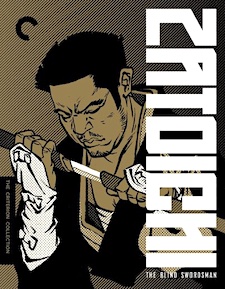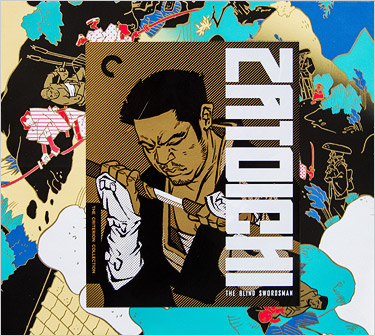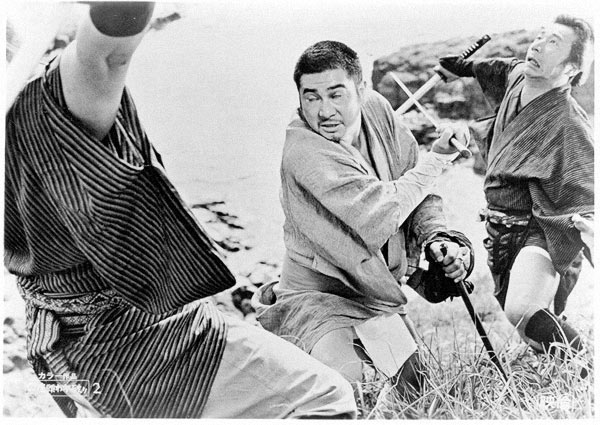Zatoichi: The Blind Swordsman (25-Film Box) (Blu-ray Review)

Director
Various (see review text)Release Date(s)
1962-1973 (November 26, 2013)Studio(s)
Daiei Studios/Toho Co. Ltd./Katsu Production Co./Janus Films (Criterion - Spine #679)- Film/Program Grade: See Below
- Video Grade: A-
- Audio Grade: B
- Extras Grade: A
- Overall Grade: A
Review
It’s the little things that make life grand. Little pleasures, like steaming hot pie (pizza or rhubarb), a good comic book, a fine beer, killer klowns, spaghetti westerns or even a giant robot flick. But nothing – and we mean nothing – is better than watching a blind samurai kicking ass in the comfort of your home theater. And there’s really only one blind samurai worth his salt: the legendary Zatoichi.
Ichi first appeared in a 1948 short story by novelist Kan Shimozawa, based on a real historical incident that took place in 1840s Japan. (To put this era in context, the California Gold Rush was underway in the States and Morse had just invented the telegraph.) Japan was in the midst of its Edo period, under the rule of the Tokugawa shogunate. Shimozawa’s story tells of war between two yakuza bosses, one of whom had enlisted the support of a travelling masseur with uncanny abilities. In this passage lies the key to the character: “Blind though he was, Zatoichi was a master swordsman with a lightning draw: He had only to lay a hand on his sword for an opponent to shrivel in fear.”
Shimozawa’s story was so popular that Daiei Studios (now Kadokawa Pictures) quickly seized the opportunity to adapt it into a jidai-geki film, featuring one of their young contract players, Shintaro Katsu. The studio had struggled to find the right vehicle for the actor, but with 1962’s The Tale of Zatoichi they realized that Katsu could play a classic anti-hero with tremendous financial success. Because television came relatively late to Japan, the local film studios chose to compete by bringing the new medium’s serialized storytelling to theaters first. As a result, Katsu’s Zatoichi starred in no less than 26 films between 1962 and 1989 – a series that was as popular in Japan as the James Bond films are elsewhere. The Ichi films offer not only gripping chanbara (swordplay) action and dynamic widescreen cinematography, but also a surprising degree of humor and humanity. Though Ichi is a yakuza of extraordinary and deadly ability, he only uses those talents when forced by his enemies and then usually in service of the poor and downtrodden – all no doubt keys to the franchise’s success. When film could no longer outcompete the small screen in the 1970s, Katsu appeared as Ichi in some 100 TV episodes as well.
The opportunity to watch the character grow over so many years and adventures in the hands of a single actor is part of what makes this series so enjoyable. Shintaro Katsu was an instinctive entertainer and a fine character actor, whose ability to convey emotion with movement and gesture follows in the tradition of Charlie Chaplin and Buster Keaton. His popularity in Japan could be compared to that of John Wayne in the Hollywood cinema. In addition to his extraordinary performance in front of the camera, Katsu directed two of the Ichi films, Zatoichi in Desperation in 1972 and a final installment in 1989 (more on that in a minute). He personally choreographed nearly all of the sword fights in these films. He even produced several of the films after Daiei went bankrupt, as well as the popular Lone Wolf and Cub series of films which starred Katsu’s older brother, Tomisaburo Wakayama. It may also surprise you to learn that Katsu was Akira Kurosawa’s original choice to play the title character in the 1980 epic Kagemusha. Though the role was written for him, it eventually went to Tatsuya Nakadai when Katsu and Kurosawa were unable to resolve a conflict of personality in their work methods. Nevertheless, another longtime Kurosawa collaborator, Toshirô Mifune, co-starred with Katsu in two films in something of a talent swap: Mifune appeared in the 1970 Zatoichi Meets Yojimbo (produced by Katsu – a sly reprisal of Mifune’s character from Kurosawa’s Yojimbo and Sanjuro), while Katsu in turn appeared in the Mifune-produced Incident at Blood Pass that same year (which is neither a Zatoichi or a Yojimbo tale).
Criterion’s Dual Format release collects all of the first 25 original Zatoichi films together in one boxed set, on both Blu-ray and DVD formats, including the rare Zatoichi’s Pilgrimage, which fans will know has never been officially released on disc here in the States.
The Blu-ray high-definition image quality is impressive, especially when you consider the age of this material and the fact that older Japanese films have sometimes suffered from poor preservation. The first two installments are presented in their original black and white. Contrast is superb, with rich blacks and surprisingly good shadow detailing. Detail is subtle and refined, with lovely texture and light grain apparent, all of which renders a very film-like appearance to the image. Beginning with the third installment, the films appear in color. As with the black and white image, texture and detail are terrific, aside from the odd shot here and there that appears optically soft. Colors are accurate at all times, though they can often be somewhat muted as a result of choices in production design. Contrast is also generally quite good in the color films, with mostly deep blacks, though the first couple (and also the later films of the 1970s) do tend to have blacks that are a bit more crushed, probably due to changes in the film stocks used over that period. The color films of the mid-to-late 1960s are the best looking of the lot. All of these masters have also been digitally cleaned of dust and dirt, so really only the occasional nick on the print is visible. Frankly, the most impressive aspect of Criterion’s work here is that, in spite of subtle variations, these films consistently exhibit a very high level of video quality, particularly for such a large group of films produced over a wide range of time. Even if you chose only to watch these films on the anamorphic widescreen DVD versions available here, you’d be seeing them in better quality than ever before. But viewing them in fully-restored, high-bitrate HD on Blu-ray is truly revelation for Zatoichi fans. Every blade of grass, every strand of straw in a hat, the hand-worn texture of Ichi’s cane sword handle – it’s all here to delight the viewer.
The original Japanese audio is presented in 48/24 LPCM 1.0 mono on Blu-ray for all the films, with English subtitles, while the DVDs offer the same in Dolby Digital 1.0 mono. The audio is exactly what you’d expect from mono tracks of this age – somewhat flat sounding but generally clear and accurate outside of a bit of distortion in the opening credit music, which is an issue of the source material and nothing to do with the BD mastering. Such limitations aside, the audio quality in this set is very respectable overall and, like the video, is as good here as it’s ever been. For those of you who may be wondering, the packaging indicates that these are new English subtitle translations and Criterion has confirmed to us that the subtitles for all the films have been revised for this set. (So now, in the first film for example, Ichi more correctly smells the plum blossoms instead of apricot as in the previous Home Video DVD release.)
As you’d expect from Criterion, there are a number of fine extras included – not a large amount of material, but the quality and rarity of what you get is extraordinary. It starts with the original Japanese theatrical trailers for all 25 films in the set, each in remastered HD on the Blu-rays (and anamorphic widescreen on DVD). Yep – all 25. Then you get a 58-minute documentary by filmmaker John Nathan called The Blind Swordsman. This was produced on 16mm in 1978 for a series on the Japanese people on PBS. To call this a remarkable find for Ichi fans is an understatement. Nathan and his crew essentially followed actor Shintaro Katsu around for three months during the filming of an episode of the TV series. You see Katsu on the set directing the episode, with his slavishly-loyal team in their production offices, in extraordinarily candid moments with his children, in full drunken revelry at a disco with his entourage and even with his father, who was a respected shamisen musician. At several points in the piece, Katsu lays bare his thoughts and feelings to Nathan in interview moments. You even see Katsu telling his teenage daughter that she’s free to marry anyone she wants to, whether or not he approves of her choice – but that under certain circumstances he might have to kill the man. As a fascinating glimpse of Katsu, the human being, this piece is unrivalled. You get a picture of a man who was intensely loyal, full of contractions, creatively brilliant and who was frequently driven by his passions to excess – very much the ‘live fast and die hard’ character his reputation suggests, but also much more. The documentary is accompanied by a new 18-minute retrospective interview with Nathan, who recalls additional stories of his time with Katsu. Then you get an excellent 27-minute interview with the British film critic and Asian cinema historian Tony Rayns, who offers expert detail and background information on Katsu and the films to place them in the proper context. All of these video-based extras are available on both the Blu-ray and DVD discs here.
Finally, the box set includes a 95-page hardback book that offers an essay on the character by critic Geoffrey O’Brian, plot summaries and background notes on all 25 films by Chris D. (with credits and original artwork for each), a new English translation of Kan Shimozawa’s complete original short story – an extraordinary treat all by itself – and additional notes about the transfers and remastering work. For English speaking audiences, there’s been a dearth of truly informed and accurate information about the history of the Zatoichi films available outside of Japan. So as a fan, starved to learn more about this actor and his greatest character, what you get here feels like treasure. Every bit of this material is worth sinking your teeth into.
All of it comes packaged in an oversized cardboard slipcase, decorated with brightly-colored Sotatsu-style artwork featuring the character in various iconic moments. Inside is the hardback companion book as well as a thick, book-like package that contains the actual discs – 27 in all. When you open the package, the right-hand page holds a Blu-ray while left side lists the films it contains. The left-hand page then opens further to reveal a pair of DVDs containing the same films. It continues like this for page after page and film after film. Here’s a look at the set’s open packaging…
A couple of additional notes: If you love these films as much as we do, once you’re finished with this set (and – trust us – it’s going to take you a while), we’re pleased to say that there’s still more for you to enjoy. As we suggested earlier, the story of Katsu’s Zatoichi continued in two Japanese TV series. The first, The Tale of Zatoichi (known as Zatoichi Monogatari in Japan), appeared in 1974 and ran for 26 episodes. This was followed by a second TV series in 1976, New Zatoichi (or Shin Zatoichi), that ran for three more seasons – 29 episodes in 1976, 19 episodes in 1978 and 26 episodes in 1979. The first series is still available on DVD in 6 volumes from Tokyo Shock. All three seasons of the second series are now finally available on DVD too (if “unofficially”) from SamuraiDVD.com. In addition, Katsu produced and directed one additional feature film in 1989, Zatoichi (also sometimes known as Zatoichi: Darkness is His Ally), which is available on DVD from Tokyo Shock as well. The difference in rights assignments explains why this final film isn’t included in the Criterion box (and obviously the TV material would fill a whole other box set by itself). It’s worth noting though that the character evolved significantly over the TV series, so the 1989 film in many ways doesn’t really fit with the previous installments included here. Hopefully, Tokyo Shock will release the final film on Blu-ray separately in the future.
In our more than sixteen years of work covering the home video industry here at The Digital Bits, this is probably the box set that’s most surprised and delighted us – not just because we love these films so much or because Criterion has delivered them in their trademark high level of quality, but also because we never seriously imagined a set like this would ever see the light of day on DVD, much less Blu-ray. A Zatoichi BD box has been a dream release for us – a holy grail to rank right up there with Warner’s Blade Runner: The Final Cut briefcase. Now here it sits, in our grateful hands, and we are appropriately amazed. Not every Zatoichi film qualifies as great cinema, but even when the series falters a bit, every single one of these films is still well worth your time. You simply can’t go wrong here. Criterion’s Dual Format Zatoichi: The Blind Swordsman box set gets our highest recommendation… and damn well deserves it. This is 25 films’ worth of pure samurai awesome.
- Bill Hunt and Todd Doogan
That concludes our overall review of this box set, but if you continue reading over the next several pages (or simply select titles from the list below), you’ll find our reviews of all 25 films in this set – easy guides to lead you into the world of Zatoichi. Each review is accompanied by original art Criterion commissioned for the film. Note that, in a unique move, Criterion has given only the entire box a spine number, not the individual films.
Zatoichi: The Films Reviewed
- The Tale of Zatoichi
- The Tale of Zatoichi Continues
- New Tale of Zatoichi
- Zatoichi the Fugitive
- Zatoichi on the Road
- Zatoichi and the Chest of Gold
- Zatoichi’s Flashing Sword
- Fight, Zatoichi, Fight
- Adventures of Zatoichi
- Zatoichi’s Revenge
- Zatoichi and the Doomed Man
- Zatoichi and the Chess Expert
- Zatoichi’s Vengeance
- Zatoichi’s Pilgrimage
- Zatoichi’s Cane Sword
- Zatoichi the Outlaw
- Zatoichi Challenged
- Zatoichi and the Fugitives
- Samaritan Zatoichi
- Zatoichi Meets Yojimbo
- Zatoichi Goes to the Fire Festival
- Zatoichi Meets the One-Armed Swordsman
- Zatoichi at Large
- Zatoichi in Desperation
- Zatoichi’s Conspiracy







